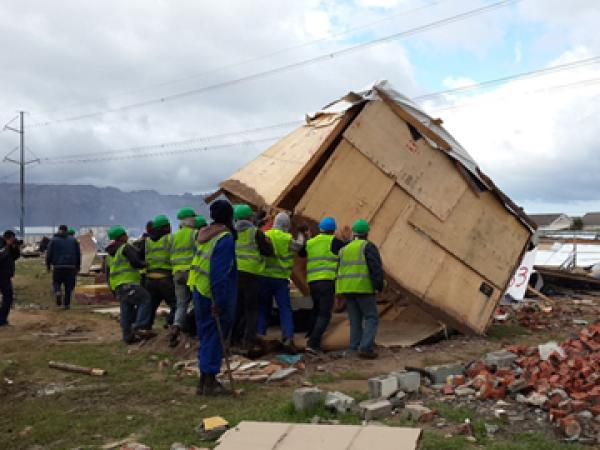Cape Town’s informal settlements the same, despite facelift

Ruth Massey recently undertook doctoral research in Cape Town’s Makhaza and New Rest settlements. Here, she shares her concerns about the way informal settlements are being managed.
In 2013 Cape Town had an estimated 193 000 households in 204 informal settlements. These numbers increase every year as people migrate to the Western Cape from various rural areas and small towns. In order to address the housing and infrastructure needs of those living in informal settlements, the local Housing Department has undertaken various large-scale upgrading programs.
Driving past the upgraded informal settlements of Cape Town, one cannot help noticing that backyard-shacks, illegal electricity connections and illegal home-based businesses are still common place amongst many of the formal houses built by the local municipality.
Is this return to a state of informality simply a result of increased urbanisation (as the City of Cape Town believes) or an outcome of bad planning and a lack of institutional foresight?
I recently undertook doctoral research in Cape Town’s Makhaza and New Rest settlements in an attempt to answer these questions. The study also explored the governmentality (rationalities, practices and techniques) of the City in its upgrading of the two sites and the impact of this governmentality on residents’ social networks.
The study uncovered some interesting findings. One of the main discoveries was that the mentality governing the decisions of the City of Cape Town (the City) in its planning and implementation of informal settlement upgrading differs from those living within the settlements. The City has a largely technocratic, functionalist and capital-based mentality that is driven by engineering standards which are in line with national policy documents, budgets, mandates and targets. Also, the City has modernist ideas of how cities should appear and function which has meant that the formalised settlements in Cape Town have not been designed with the largely social and cultural mentality of the residents in mind.
While the City’s mentality, based on managerial and administrative systems and planning, seems wholly logical in its own right, and is seen to be based on best practice and sound planning principles, it unfortunately has unintended and negative outcomes for residents.
One of these outcomes is that the upgraded settlements have failed to meet the needs of those living within them. These needs are largely social and include regular meeting places and space for extended family members, areas for undertaking businesses and spaces for self-governance. Social networks play a critical role in determining how these communities manage and solve problems, and how they organise themselves, as well as the degree to which individuals succeed in achieving goals. Residents tend to access economic and other assets through their social networks which are enabled by their living spaces.
Unsurprisingly, many residents have responded to their needs not being met by illegally and informally transforming their living spaces. Formalised settlements have been overcome by backyard (and front yard) dwellings, shebeens, spaza shops and illegal water and electricity connections.
Another interesting finding from the research was that the City assumes the existence of a collective, mutual mentality that, in reality, is fictional. The formalisation of informal settlements has also not changed the mentality of the residents from a social to an economic one. The residents have not assimilated into the formal economic system as might have been assumed. Instead, they have retained their organic, flexible system of social networks and have redesigned their new settlement to meet their needs.
My research has shown that the inability of formalised settlement to meet the needs of residents and the subsequent return to informality runs deeper than a simple lack of dialogue, urbanism, inadequate participation and / or general miscommunication. It is a consequence of the disjuncture between those who plan and those who are planned for.
The good news, however, is that moves have been made by the City to bridge this gap. The City will need to use a more integral approach in formalisation and design that takes into account and plans with an understanding of the varying mentalities that exist. Those in power must be aware of and include all perspectives and actors within their upgrading process and practice.
This is crucial to understand fully and respond appropriately to the challenges faced in upgrading, and to meet the varying and dynamic needs of those living in the formalised settlements.
The author is a lecturer at the University of the Free State. This article is based on her recent doctorate in Geography and Environmental Studies at Stellenbosch University.
Next: Evicted woman: “I came to Cape Town to give my children a better future”
Previous: Floods as storm hits Cape Town

This article is licensed under a Creative Commons Attribution-NoDerivatives 4.0 International License.


